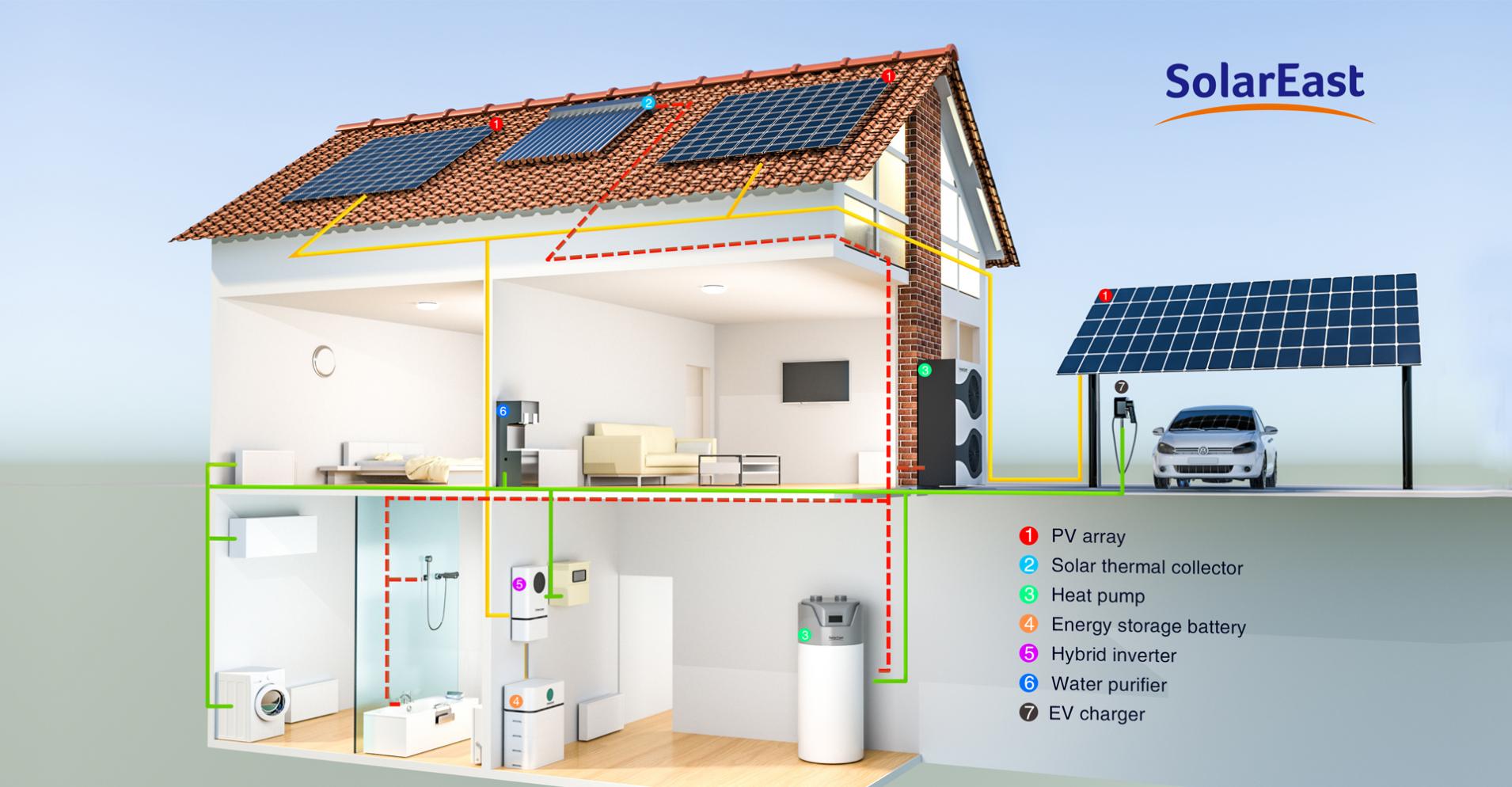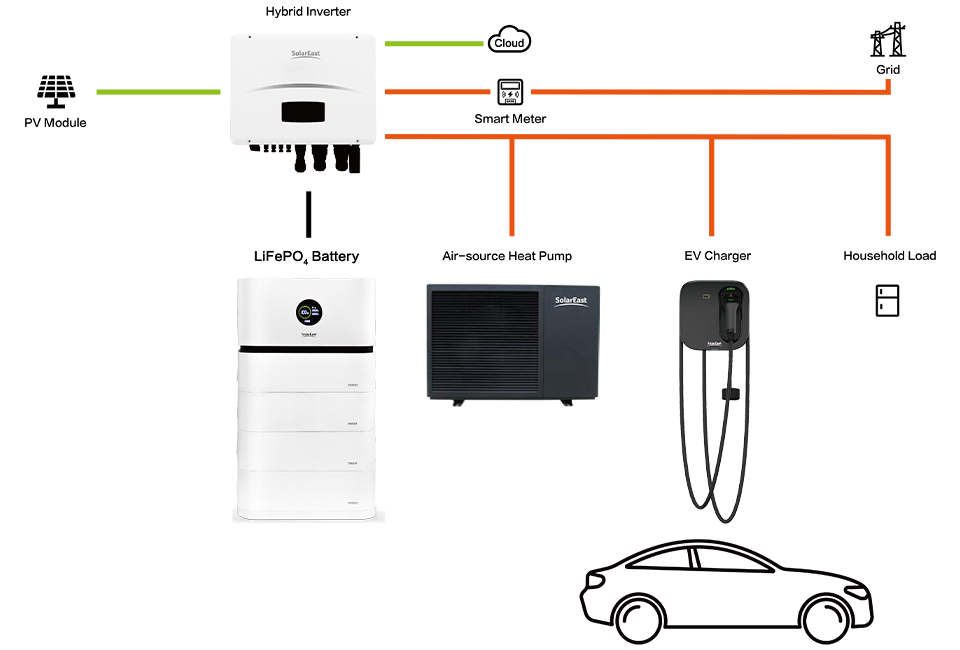In today's fast-evolving energy landscape, businesses and homeowners alike are seeking more sustainable, cost-effective ways to generate, store, and utilize energy. Integrated energy storage systems (ESS) have emerged as a vital component of this transition, enabling users to maximize energy independence, reduce utility costs, and enhance energy efficiency. SolarEast, a leading comprehensive energy storage system solution provider, has recognized the growing demand for seamless energy systems that combine power generation, storage, and energy usage in one efficient package.
This article explores how integrated energy storage systems work, their advantages, and how they play a crucial role in enhancing energy independence while optimizing energy usage.
What is an Integrated Energy Storage System?
An integrated energy storage system combines various components to enable efficient power generation and energy storage, as well as consumption. Typically, an integrated system includes photovoltaic (PV) modules, energy storage batteries, inverters, and additional systems such as heat pumps and electric vehicle (EV) chargers. By integrating these technologies, users can create a reliable, self-sufficient energy network that generates renewable power, stores it for later use, and minimizes reliance on the grid.
In a typical integrated energy storage setup:
- PV Modules: Solar panels (usually high-efficiency mono-crystalline cells) capture sunlight and convert it into electricity.
- Energy Storage Batteries: The electricity generated by the solar panels is stored in batteries, allowing users to draw power during periods of low sunlight or at night.
- Hybrid Inverter: Converts direct current (DC) from solar panels and batteries into alternating current (AC) for appliances, and manages the charging and discharging of energy storage batteries, ensuring efficient energy flow.
- Heat Pumps and EV Chargers: Optional systems, such as air-source heat pumps for heating and EV chargers, can further optimize energy use.
By combining these components into a unified system, an integrated energy storage system solution offers a seamless way to meet a variety of energy needs while minimizing environmental impact and reducing overall costs.
Integrated Energy Storage System Solution
How Integrated Energy Storage Systems Maximize Energy Independence
Maximizing energy independence means reducing reliance on external energy sources, such as the national grid, and generating and storing enough energy on-site to power daily operations or living spaces. Here's how integrated energy storage systems help achieve this goal:
1. Harnessing Renewable Energy with PV Modules
The foundation of any integrated energy storage system is the ability to capture clean, renewable energy from the sun. Photovoltaic (PV) panels, especially those using high-efficiency mono-crystalline cells, are highly effective at converting sunlight into usable electricity. The energy generated during the day can be stored in batteries, ensuring a continuous energy supply even when sunlight is no longer available.
By generating their own power through both power generation and energy storage, users can greatly reduce their dependence on traditional utility providers, lowering their energy bills and minimizing their carbon footprint.
2. Energy Storage for On-Demand Power
Energy storage is crucial for users who want to ensure reliable power availability around the clock. Even in the absence of sunlight, stored energy can be accessed to power homes or businesses. This "on-demand" energy access significantly enhances energy autonomy, particularly for businesses that require constant uptime or individuals in remote areas without easy access to the grid.
Energy storage batteries store excess power generated during peak sunlight hours and release it during off-peak times. This helps users avoid higher energy costs associated with peak hours and provides a buffer in case of grid outages, enhancing overall system resilience.
3. Optimizing Energy Usage with Heat Pumps
Energy storage systems can also integrate with other energy-efficient technologies, such as air-source heat pumps. Air-source heat pumps absorb heat from the outside air and transfer it indoors for heating or water heating, using refrigerants to achieve efficient thermal energy transfer, making them significantly more efficient than traditional heating systems.
With an integrated energy storage system, the energy needed to run heat pumps can be supplied by solar panels or stored electricity, providing substantial savings. Heat pumps can save up to 70% of electricity compared to conventional electric heating systems, significantly lowering operational costs while contributing to a more sustainable energy footprint.
4. EV Charging for Future-Proof Mobility
As electric vehicles (EVs) become more common, integrating EV charging stations into energy storage systems offers significant advantages. By pairing an EV charger with a solar-powered integrated energy storage solution, businesses and homeowners can charge their vehicles using self-generated energy. This reduces dependency on the grid while further supporting a clean, green energy ecosystem.
Moreover, when an EV is plugged into an integrated energy storage system, it can potentially serve as an additional energy storage option, feeding stored energy back into the home or business during power shortages. This bi-directional charging capability offers an added layer of energy security.

Benefits of Integrated Energy Storage Systems
The benefits of adopting an integrated energy storage system solution are compelling and multifaceted. Here are the key advantages:
1. Cost Efficiency
Integrated energy storage systems help businesses and homeowners cut energy costs in multiple ways. By generating and storing their own energy, users can avoid high energy tariffs during peak demand times. They also reduce reliance on expensive fossil fuels, further lowering energy expenses.
2. Environmental Sustainability
By using renewable energy sources like solar power and improving energy efficiency with systems like heat pumps, integrated energy storage solutions help reduce carbon emissions. This contributes to sustainability goals and minimizes environmental impact.
3. Energy Security and Reliability
Energy storage systems enhance the reliability and security of power supply. In the event of power outages or disruptions to the grid, users can continue to use stored energy, ensuring business continuity or comfort at home. This makes integrated systems especially appealing for businesses with critical energy needs.
4. Scalability
Integrated energy storage systems are flexible and can be scaled according to the needs of the user. As energy requirements grow, more solar panels, batteries, or additional modules like heat pumps and EV chargers can be added to the system. This makes integrated energy storage solutions ideal for both residential and commercial applications.
Conclusion
Integrated energy storage systems are the cornerstone of energy independence, providing businesses and homeowners with the tools they need to generate, store, and efficiently use energy. These systems combine solar power generation, energy storage, heat pumps, and EV charging to create a seamless, cost-effective, and sustainable energy solution. Additionally, their scalability ensures that integrated energy storage systems can evolve with your growing energy needs, providing a truly future-proof solution.
At SolarEast, we specialize in providing integrated energy storage system solutions designed to maximize efficiency and savings while helping customers reduce their carbon footprint. Whether you're looking to increase energy security, lower costs, or create a more sustainable energy infrastructure, SolarEast's comprehensive energy storage system solutions provide the foundation for a reliable, future-proof energy solution.





